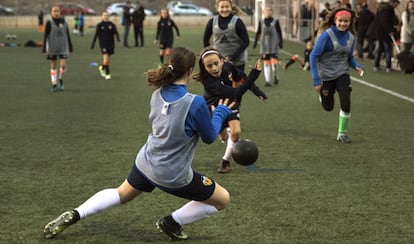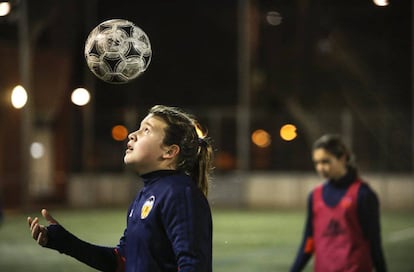The 11-year-old Spanish girls smashing gender stereotypes through soccer
Valencia’s FC junior girl’s team has steamrolled the all-male competition, winning widespread admiration and surprising many

Girls are playing soccer against boys – and winning. Every weekend, Valencia’s FC junior women’s soccer team is beating its male rivals at official competitions. The team stands out for its discipline, ball skill and fierce competitiveness. The girls of Valencia FC are the top team in a league of all boys, kicking back at stereotypes that say soccer is a male sport, and winning the admiration of both parents and rivals. These 11-year-old girls are focused and continuing to prove wrong the clichés about women in sport.
Within the first five minutes of the game they realize that we play well Miguel Ángel Ortiz
“They’re very good, coordinated, prepared, and physically strong,” says Sergio Sánchez, the coach of the rival FC Cambridge Black Cats. “They beat us 0-1, a goal that they scored in the first 54 minutes of the game. They play a very good game, they play with intensity, throw themselves into it and are tough when they have to be.”
In the world of soccer, teams from schools run by major clubs typically win because they have the means to recruit better players. It is difficult for any ordinary local team to beat them. To win, these teams need to get lucky with a particularly gifted generation of players, otherwise they end up competing for second place.

But in this remarkable case, the team that has won all their games – scoring 90 goals with only four against – is a women’s team from the Valencia Academy FC.
But why is a girl’s team competing in a men’s league? Sergio Fernández, women’s team coordinator at Valencia FC, explains: “We need our players to keep improving so that when they get to soccer 11 and have to go up against girls who may be better than them, they’ll have a leg-up on the competition,” he says. “Competing against boys’ teams gives them a physical advantage. At this age, there aren’t many differences between a boy’s body and a girl’s – later on there will be, but right now, they can play together.”
“When they physically can no longer compete against boys, they’ll move onto a women’s league, but they’ll be better prepared,” he continues. “The idea is that when they play against other women they’ll be better after having played with boys from when they were 10 to 15. In the end it’s about nourishing women’s club soccer and giving them greater potential.”
Nobody thought a girl’s team would be first in a group of just boys Sergio Fernández
But not even Fernández expected them to be so successful: “The surprise is that they are coming first. Nobody thought that a girl’s team would be first in a group of just boys.”
The girls have been the stars of the competition since they scored 11-0 against their opponents in their first match. “We haven’t won anything,” says the girls’ coach Miguel Ángel Ortiz. “I don’t understand all the commotion, we’ve only just finished the first round in first place and nothing more.”
Ortiz knows that showing up with a women’s soccer team took their rivals by complete surprise. “People found it shocking. A lot of teams underestimated us. I haven’t heard any derogatory comments, but I have heard some misgivings,” he says. “The first thing parents of players from opposing team is see that girls are going to play against boys, and they don’t believe they are up to it. Then we start to play and within the first five minutes of the game they realize that we play well and can compete,” says the coach, adding that their opponents “treat them equally on the field” and are respectful. “They take us very seriously. They don’t see us differently because these girls don’t play differently. The boys don’t feel like they need to go easy on them because they are girls. Our team goes in for the kill.”
English version by Laura Rodríguez.
Tu suscripción se está usando en otro dispositivo
¿Quieres añadir otro usuario a tu suscripción?
Si continúas leyendo en este dispositivo, no se podrá leer en el otro.
FlechaTu suscripción se está usando en otro dispositivo y solo puedes acceder a EL PAÍS desde un dispositivo a la vez.
Si quieres compartir tu cuenta, cambia tu suscripción a la modalidad Premium, así podrás añadir otro usuario. Cada uno accederá con su propia cuenta de email, lo que os permitirá personalizar vuestra experiencia en EL PAÍS.
¿Tienes una suscripción de empresa? Accede aquí para contratar más cuentas.
En el caso de no saber quién está usando tu cuenta, te recomendamos cambiar tu contraseña aquí.
Si decides continuar compartiendo tu cuenta, este mensaje se mostrará en tu dispositivo y en el de la otra persona que está usando tu cuenta de forma indefinida, afectando a tu experiencia de lectura. Puedes consultar aquí los términos y condiciones de la suscripción digital.








































